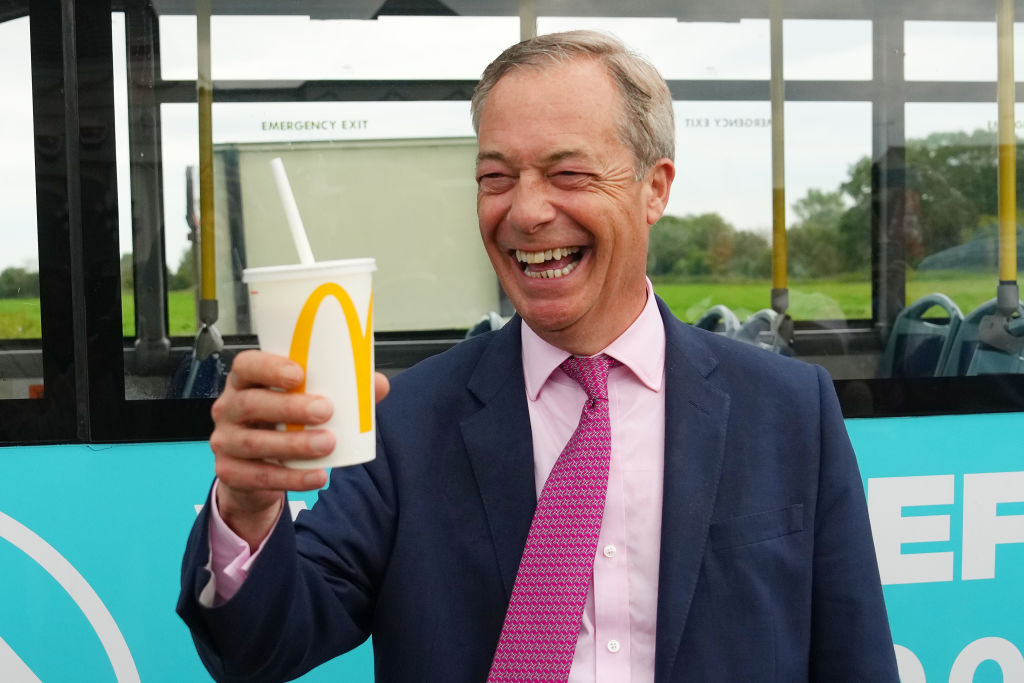A spectre is haunting the Conservative Party — the spectre of populism. With the polls showing Reform UK gaining on the Tories, and Nigel Farage welcoming high-profile defectors on a weekly basis, a realignment on the Right seems closer than ever.
But for disgruntled ex-Tories who might view Reform as the answer to the Right’s unpopularity, there’s a major problem: Farage’s party is almost as unpopular with younger voters as the Conservatives are.
This week, a feature from Sky News gave the impression that young people are flocking to the Reform banner. That’s mainly based on the strength of the party’s social media operation. But when it comes to actual votes, the picture is less impressive. According to YouGov, the Reform vote share at the general election was just 9% among 18-24 year olds. That compares to 41% for Labour, 18% for the Greens, 16% for the Lib Dems and a miserable 8% for the Tories. Reform did only slightly better among the 25-29 and 30-39 age groups.
A survey for Lord Ashcroft Polls shows a similar pattern, with the party’s overall performance being pulled up by the old and down by the young. The age-related skew isn’t as extreme as it is for the Conservatives, but it is unusual by international standards. Just look at America, where, according to a Tufts University study, Donald Trump was re-elected with the support of 47% of 18 to 29-year-old voters.
Evidently, the Right needn’t pander to political correctness to win over Zoomers and Millennials. Compared to 2020, Trump achieved a 15-point increase in support from young men and an eight-point increase from young women.
The situation in Canada is even more dramatic, where Pierre Poilievre has rejuvenated the Right. Despite the existence of Left-wing alternatives to Justin Trudeau’s clapped-out Liberal government, younger voters have swung behind the Canadian Tories, who now lead among under-35s. Meanwhile in Europe, parties of the populist Right tend to do better with 20- and 30-somethings than among pensioners. Examples include the National Rally in France and the AfD in Germany.
So why is the pattern so different in the UK? One explanation is Brexit, a wedge issue that has undeniably divided the generations. And yet the further we get from 2016, the less relevant it becomes — especially for new voters.
More important are the vibes given off by each party. Where Trump has surrounded himself with dynamic younger figures such as JD Vance, Vivek Ramaswamy and Tulsi Gabbard, and the RN’s Marine Le Pen is complemented by her 29-year-old heir apparent Jordan Bardella, Farage’s party has no equivalent. There is 38-year-old Reform chairman Zia Yusuf, but he doesn’t yet have the profile of those figures.
Reform also lacks a policy offer for younger people. In contrast to Poilievre, it’s hard to imagine Farage going all out for building new and affordable homes. Nor is he likely to appeal to environmentalism as Bardella has.
Of course, every vote counts — no matter how decrepit the voter. So does it matter if Reform’s voter base is richer in years than Right-wing parties in other countries? Not at any one general election, but over several electoral cycles it most certainly does.
The Times estimates that one in six Tory voters will die by the next election. Without change, the Conservatives are heading for extinction. It should therefore concern defectors to Reform UK that their new party faces a similar generational issue. Swapping one ageing party for another is hardly an effective plan for survival.











Join the discussion
Join like minded readers that support our journalism by becoming a paid subscriber
To join the discussion in the comments, become a paid subscriber.
Join like minded readers that support our journalism, read unlimited articles and enjoy other subscriber-only benefits.
Subscribe